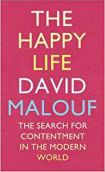The Happy Life: The Search for Contentment in the Modern World by David Malouf
| The Happy Life: The Search for Contentment in the Modern World by David Malouf | |
|
| |
| Category: Popular Science | |
| Reviewer: Robin Leggett | |
| Summary: Very brief musings on why, despite so many beneficial advances, happiness for most remains elusive. | |
| Buy? Maybe | Borrow? Yes |
| Pages: 112 | Date: December 2011 |
| Publisher: Chatto and Windus | |
| ISBN: 9780701187118 | |
|
| |
There's something quite uplifting about the physical brevity of David Malouf's The Happy Life which is subtitled The Search for Contentment in the Modern World. It suggests that it is easy to find, when of course, the whole point of the book is that despite, or perhaps because of, scientific and technological advances that have taken away many of the causes of true unhappiness in the world, it remains elusive for most. Who can say that they are truly happy? The book runs to less than 100 pages if you take out the Notes section, and the typeface is large. It is, by any reckoning a slim offering.
Fans of Malouf's fiction, amongst which I firmly class myself, will know that he has a beautiful way with words and his arguments are always interesting. Like much of philosophy, of which inevitably this enters into, the ideas often leave the reader with the longing to interject and cross-question. I didn't always fully agree with some of his points, but the sense if more like sitting next to a warm fire with a glass of something equally warming and having an interesting discussion rather than being given a lecture.
Two elements though made me less than, well, happy. The first is an inconsistency with the Notes section. It's debatable how much this adds to the book. At one level it could be a list of sources of the quotes, at another an opportunity to provide some background notes to some of those quoted. Malouf does both, but neither consistently. Personally, I think it is largely unnecessary here altogether. He provides a straight reference for quotes from Solzhenitsyn (whose Shukhov he concludes is the closest we come to managing happiness) and Montaigne but others are merely referenced in text while poor old Shakespeare gets quoted from Othello without even a mention of where the quote comes from or who it is by. At other times he gives some background to the pieces quoted which is at least more interesting. Whatever method you chose, pick one and be consistent.
The second element is that in a book this short, there is little scope for going off topic and this he rather does in the chapter entitled Happiness in the Flesh, which unfortunately I, like most I suspect was drawn to in the way that you want to look up rude words in a new dictionary! Here he starts to delve into art criticism, which he does well, mostly concentrating on Rubens but a little strangely jumps to Rembrandt before returning to Rubens. It looks like it has been rather heavily edited down and has lost some of his flow. I have a minor gripe with the inclusion of black and white reproductions of the two works of art shown which always seems incongruent with the descriptions of colour and texture when the reader struggles to even make out the basic image, but doubtless economics prevent colour plates.
Overall, his argument is fairly straightforward. He delves back to the Greek philosophers who were most concerned with happiness before interestingly considering Jefferson's inclusion of the pursuit of happiness in the American Declaration of Independence and then considering how this does, or doesn't relate to modern life. His idea is largely that the barrier to happiness is the erosion of human form. The Greeks anthropomorphized the fates into the form of Gods which made them easier to cope with he suggests although he stops short of suggesting that the current Greek crisis would be easier to cope with if they came up with some kind of God of Debt.
It's a light and thoughtful exploration if not a particularly detailed one. It won't change the world, but it might make you happy for the couple of hours or so it takes to read it.
We would like to thank publishers Chatto and Windus for making us a bit happier.
For more excellent philosophical musings, Breakfast with Socrates by Robert Rowland Smith is highly recommended, while the author's relationship with those ancient Greeks gets an excellent fictional airing in Ransom by David Malouf.
Please share on: ![]() Facebook,
Facebook, ![]() Twitter and
Twitter and
![]() Instagram
Instagram
![]() You can read more book reviews or buy The Happy Life: The Search for Contentment in the Modern World by David Malouf at Amazon.co.uk Amazon currently charges £2.99 for standard delivery for orders under £20, over which delivery is free.
You can read more book reviews or buy The Happy Life: The Search for Contentment in the Modern World by David Malouf at Amazon.co.uk Amazon currently charges £2.99 for standard delivery for orders under £20, over which delivery is free.
![]() You can read more book reviews or buy The Happy Life: The Search for Contentment in the Modern World by David Malouf at Amazon.com.
You can read more book reviews or buy The Happy Life: The Search for Contentment in the Modern World by David Malouf at Amazon.com.
Comments
Like to comment on this review?
Just send us an email and we'll put the best up on the site.


